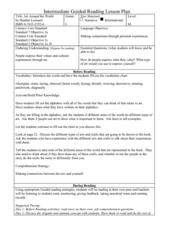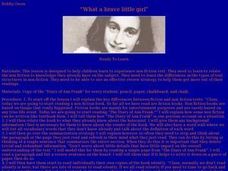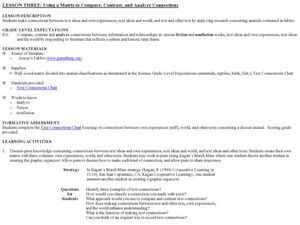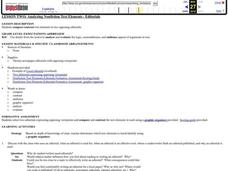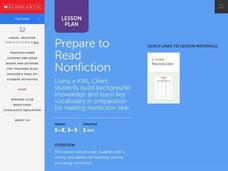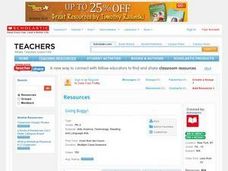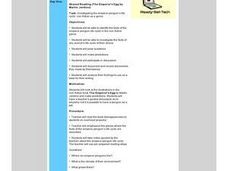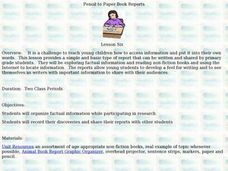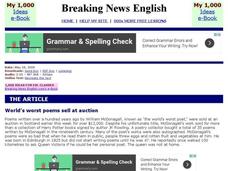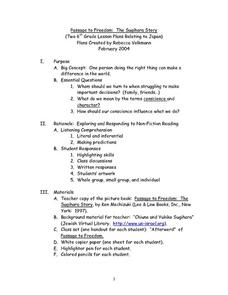Curated OER
Art Around the World
The non-fiction book Art Around the World by Heather Leonard serves as inspiration for learning how art reflects cultures and values. New vocabulary and background knowledge are fleshed out before reading the story. Afterward, the class...
Curated OER
What a Brave Little Girl
Young scholars practice relating non-fiction to knowledge they already have on the subject. They evaluate differences in the types of text structrures in non-fiction. They employ a review strategy that allows them to understand their...
Curated OER
Under The Sea
In this resource lesson, students use non-fiction books to research ocean animals. Students discover the many features of non-fiction books and how to use these features to help them conduct research. Students then categorize ocean...
Curated OER
Analyzing Irony in Nonfiction
Students examine the use of irony in non-fiction works. In this literature lesson, students read non-fiction war texts and explore the use of irony in the piece as they respond to discussion questions.
Curated OER
Reading Research!
Students observe the pictures in non-fiction books that focus on animals in the winter. In addition, they also listed to some read aloud books about hibernation, migration, adaptation and dormancy. Students draw pictures and write notes...
Curated OER
Using Non-Text Features
Second graders examine graphs and charts from their local newspaper. As a class, they discuss what the data means and how it relates to the article. In groups, they are shown two sets of graphs or charts and they practice explaining...
Curated OER
Using a Matrix to Compare, Contrast, and Analyze Connections
Young scholars explore writing techniques by comparing fiction vs. non-fiction. For this literature analysis lesson, students read stories from Aesop's Fables and compare the themes and characters to stories from their own life. Young...
Curated OER
Introduce Vocabulary: Frida
Students explore language arts by reading a non-fiction story in class. In this three tiered vocabulary lesson, students read the book Frida and discuss the real life Frida and her story. Students identify vocabulary terms in the book...
Curated OER
Analyzing Nonfiction Text Elements - Editorials
Students examine the text features of non-fiction. In this literacy lesson, students read editorial samples provided by their instructor and analyze the texts for word choice, details, and organization.
Curated OER
Establish the Theme
Second graders explore the topic of nature. In this detective lesson, 2nd graders review non-fiction materials on nature and identify text, headings, diagrams, graphs, to establish the theme of the book.
Curated OER
Prepare to Read Nonfiction
Students get an introduction to using KWL Charts as tools for reading nonfiction. They study unfamiliar words and share what they already know about the topic of the non-fiction selection and use this knowledge to help prepare to read.
Curated OER
Genres, Genres Everywhere
Young readers assume the role of Genre Sleuths to investigate the characteristics of folktales, fantasies, and mysteries. For this session you will need to collect a variety of books on a topic you have been studying. Groups then examine...
Curated OER
Going Buggy
Pupils identify the parts of a dragonfly that they drew. They write a very short non-fiction story (mainly with pictures) about the adventure of a dragonfly. They interview a person dressed as a dragonfly to find out some things about...
Curated OER
Very Good Facts About Very Good Books
Students identify the characteristics of fiction and non-fiction texts. In this genre study lesson plan, students read the books A Butterfly Alphabet Book and I Wish I Were a Butterfly. Students develop a graphic organizer to compare and...
Curated OER
The Emperor's Egg by Martin Jenkins
Students explore the penguin life cycle. In this penguin life cycle lesson, students read the book The Emperor's Egg by Martin Jenkins. Students look at the pictures and make predictions. Students identify facts about penguins and do...
Curated OER
Pencil to Paper Book Reports
Students explore the concept of how to write a factual book report. In this book report lesson, students conduct research on various topics. Students then use the information to write a book report in their own words.
Dream of a Nation
Creating Awareness through Action Oriented Writing and Research
Middle schoolers aren't too young to feel strongly about politics, social issues, consumer rights, or environmental problems. Demonstrate the first steps toward social change with a project about action-oriented writing. Eighth graders...
Curated OER
Real or hoax?
Seventh graders brainstorm a list of criteria that makes a webpage useful for research and not useful for research. They complete the activity, "Real or Hoax," and discuss fiction and non fiction stories and determine which websites are...
Curated OER
Coming Home:From the Life of Langston Hughes
Third graders listen to the non-fiction book: COMING HOME: FROM THE LIFE OF LANGSTON HUGHES. They identify examples of metaphors and similies within the book and understand how this figure of speech is used in writing. They then create...
Curated OER
From Fact to Fiction: The Origins of Constellations
Sixth graders investigate the constellations. In this constellations lesson, 6th graders discover where the constellations are located and the myth associated with them. Students create their own myth and make a slide show about stars...
Curated OER
Breaking News English: Poems and Poetry
In this poems and poetry worksheet, students read the article, answer true and false questions, complete synonym matching, complete phrase matching, complete a gap fill, answer short answer questions, answer discussion questions, write,...
Curated OER
Breaking News English: Book Prizes
In this book prizes worksheet, students read the article, answer true and false questions, complete synonym matching, complete phrase matching, complete a gap fill, answer short answer questions, answer discussion questions, write, and...
Curated OER
Passage to Freedom: The Sugihara Story
Sixth graders engage in the reading of a non-fiction text in order to acquire character traits as displayed in the text.The story builds reading fluency through the teacher modeling correct style and speed.
Ontario
Reading Informational Text
Learning to recognize the importance of the features of information text (i.e., titles, subtitles, endnotes, sidebars, etc.) is the focus of a reading activity designed for middle schoolers. Learners examine how these text features help...


